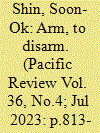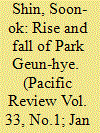| Srl | Item |
| 1 |
ID:
192549


|
|
|
|
|
| Summary/Abstract |
North Korea is a de facto nuclear weapon state, having undertaken six tests between 2006 and 2017. Throughout a series of nuclear crises, since the early 1990s, Pyongyang has not only emphasised its sovereign right to explore nuclear options as an inevitable response to a hostile United States, but has at the same time consistently embraced an anti-nuclear stance, maintaining a commitment to the ‘denuclearisation of the Korean Peninsula’. This nuclear posture – ‘arm, to disarm’ – stressing the inevitability of nuclear-arming while at the same time pledging a normative anti-nuclear commitment to denuclearisation, contains seemingly irreconcilable elements. This challenges rationalist IR theories, which are unable adequately to explain the DPRK’s position, characterising it as either a tactical diversion to disguise realist motivations or a negotiation leverage to induce economic and strategic concessions. This article offers an alternative analysis, seeking to decode the DPRK’s seemingly contradictory nuclear posture by arguing that its anti-nuclear posture has deep Cold War roots aimed at hedging its security inferiority vis-à-vis nuclear-armed enemies. It focuses on the Cold War security nexus in East Asia and examines how Pyongyang’s engagement in the anti-nuclear movement evolved to shape its seemingly irreconcilable ‘arm, to disarm’ nuclearism.
|
|
|
|
|
|
|
|
|
|
|
|
|
|
|
|
| 2 |
ID:
120388


|
|
|
| 3 |
ID:
173957


|
|
|
|
|
| Summary/Abstract |
The political turmoil prompted by the corruption scandal surrounding president Park Geun-hye and her confidante, Choi Soon-sil, convulsed South Korea in the winter of 2016/17. Park’s response was not only ineffective, but inflammatory. Intense public frustration, together with mounting circumstantial evidence, led to an impeachment process. Thus Park became the first democratically elected president to be removed. Political corruption is not new in South Korea. Yet, no previous case matches the magnitude of the Park debacle and no former president has had to sacrifice their term in office. This raises a key question: what is it that made this scandal so different? This article argues that the debate has so far paid insufficient attention to the role of the South Korean political system in explaining Park’s impeachment. The government party was the largest in the National Assembly and thus able to stop the impeachment process, but failed to do so. The article unpacks the political unrest of 2016/17 by analysing South Korean party politics, focussing specifically on the electoral structure that had been established in the post-1987 democratic era and the subsequent changes that conditioned and facilitated the political downfall of Park Geun-hye.
|
|
|
|
|
|
|
|
|
|
|
|
|
|
|
|
| 4 |
ID:
144530


|
|
|
|
|
| Summary/Abstract |
South Korea aspires to a larger regional and global role, fuelled by economic success, and complemented by cultural and diplomatic achievement. However, a gap exists between the rhetoric and reality of its foreign policy. This paper examines Seoul's middle-power activism. It poses questions about the conceptual deficit of ‘middle power’, proffering an operational definition in illuminating the characteristic identity formation of middle powers. It analyses how the Roh Moo-hyun and Lee Myung-bak governments sought to articulate their respective middle-power foreign policy aspirations. Finally, it investigates how domestic political and institutional conditions shape Republic of Korea foreign policy, and identifies policy implications.
|
|
|
|
|
|
|
|
|
|
|
|
|
|
|
|